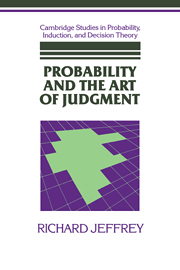Book contents
- Frontmatter
- Contents
- Preface
- 1 Introduction: Radical probabilism (1991)
- 2 Valuation and acceptance of scientific hypotheses (1956)
- 3 Probable knowledge (1968)
- 4 Probability and the art of judgment (1985)
- 5 Bayesianism with a human face (1983)
- 6 Alias Smith and Jones: The testimony of the senses (1987)
- 7 Conditioning, kinematics, and exchangeability (1988)
- 8 Preference among preferences (1974)
- 9 On interpersonal utility theory (1971)
- 10 Remarks on interpersonal utility theory (1974)
- 11 Mises redux (1977)
- 12 Statistical explanation vs. statistical inference (1969)
- 13 New foundations for Bayesian decision theory (1965)
- 14 Frameworks for preference (1974)
- 15 Axiomatizing the logic of decision (1978)
- 16 A note on the kinematics of preference (1977)
3 - Probable knowledge (1968)
Published online by Cambridge University Press: 05 June 2012
- Frontmatter
- Contents
- Preface
- 1 Introduction: Radical probabilism (1991)
- 2 Valuation and acceptance of scientific hypotheses (1956)
- 3 Probable knowledge (1968)
- 4 Probability and the art of judgment (1985)
- 5 Bayesianism with a human face (1983)
- 6 Alias Smith and Jones: The testimony of the senses (1987)
- 7 Conditioning, kinematics, and exchangeability (1988)
- 8 Preference among preferences (1974)
- 9 On interpersonal utility theory (1971)
- 10 Remarks on interpersonal utility theory (1974)
- 11 Mises redux (1977)
- 12 Statistical explanation vs. statistical inference (1969)
- 13 New foundations for Bayesian decision theory (1965)
- 14 Frameworks for preference (1974)
- 15 Axiomatizing the logic of decision (1978)
- 16 A note on the kinematics of preference (1977)
Summary
The central problem of epistemology is often taken to be that of explaining how we can know what we do, but the content of this problem changes from age to age with the scope of what we take ourselves to know; and philosophers who are impressed with this flux sometimes set themselves the problem of explaining how we can get along, knowing as little as we do. For knowledge is sure, and there seems to be little we can be sure of outside logic and mathematics and truths related immediately to experience. It is as if there were some propositions – that this paper is white, that two and two are four – on which we have a firm grip, while the rest, including most of the theses of science, are slippery or insubstantial or somehow inaccessible to us. Outside the realm of what we are sure of lies the puzzling region of probable knowledge – puzzling in part because the sense of the noun seems to be cancelled by that of the adjective.
The obvious move is to deny that the notion of knowledge has the importance generally attributed to it, and to try to make the concept of belief do the work that philosophers have generally assigned the grander concept. I shall argue that this is the right move.
A PRAGMATIC ANALYSIS OF BELIEF
(See also essay 13.) To begin, we must get clear about the relevant sense of “belief.”
- Type
- Chapter
- Information
- Probability and the Art of Judgment , pp. 30 - 43Publisher: Cambridge University PressPrint publication year: 1992



